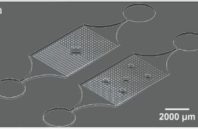Using 3D printing, researchers at the Leibniz Institute for Natural Product Research and Infection Biology (Jena, Germany) have developed complex 3D poly-di-methyl-siloxane (PDMS) chips for droplet microfluidics out of 3D glass molds fabricated with FEMTOprint (Muzzano, Switzerland) technology. This direct-writing process allows sub-micrometric resolution for developing microfluidic designs with multiple levels of continuously changing heights and complex 3D shapes. Together with the simplicity of PDMS replica molding, this approach has provided an accessible solution for specialized and non-specialized labs to customize microfluidic experimentation and expand the experiment possibilities.
3D glass molds integrate the advantages of high-resolution prototyping with the ease of production and replication offered by soft lithography. It also facilitates manufacturing of multilevel structures, even with the generation of ramps (gradients of confinement), which greatly improved key droplet microfluidic operations. This technique enables novel possibilities that can be exploited not only with droplets, but in many other microfluidics applications.

 (585) 768-2513
(585) 768-2513

